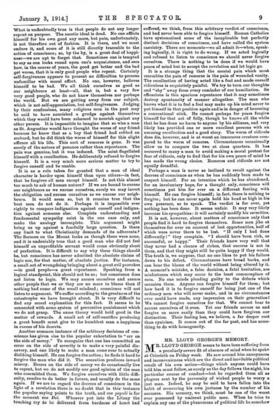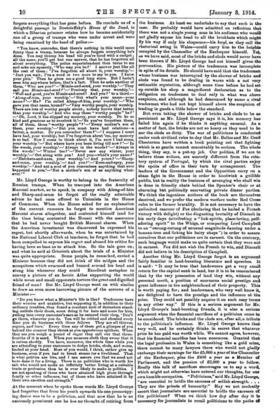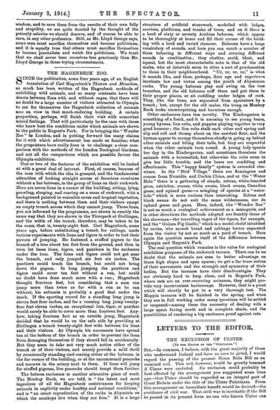MR. LLOYD GEORGE'S MEMORY.
MR. LLOYD GEORGE seems to have been suffering from a peculiarly severe fit of absence of mind when he spoke at Cricoieth on Friday week. He saw around him annoyances and inconveniences which are the direct and inevitable political result of his own action—things which anyone could have told him must follow, as surely as the day follows the night, his particular course of conduct—but he regarded them all as plagues sent by the perversity of wicked people to worry a just man. Indeed, he may be said to have fallen into the habit of measuring his own justness by the number of hie accusers. His memory, we think, must be one of the worst ever possessed by eminent public men. When be tries to explain any one of the phenomena of political life lie somehow
forgets everything that has gone before. He reminds us of a delightful passage in Dostoieffsky's House of the Dead, in which a Siberian prisoner relates how be became accidentally one of a group of tramps who were under arrest and were being examined by the head of police:—
" You know, comrades' that there's nothing in this world more funny than a tramp, because he always forgets everything he's done. You may thump his head till you're tired with a cudgel ; all the eame, you'll get but one answer, that he has forgotten all about everything. The police superintendent then turns to me and asks me squarely-, 'Who may you be?' I answer just like all the rest of them ; 'I've forgotten all about it, your worship!— ' Just you wait; I've a word or two more to say to you. I know your phis.' Then he gives me a good long stare. But I hadn't seen him anywhere before, that's a fact. Then he asks another of them, • Who are you P'—'31ithleand-ecud, your worship.'—' They call you Miesle-and-scud P'—' Precisely that, your worship.'— • Well and good, you're Minnie-and-scud 1 And you? ' to a third.—
• Aleng-of-him, your worship.'—' But what's your name—your narne?'—% Me P I'm called Along-of-him, your worship.'—' Who gave you that name, hound?'—'Very worthy people, your worship. There are lots of worthy people about ; nobody knows that better than your worship.'—' And who may these "worthy people" be P ' —' Oh, Lord, it has slipped my memory, your worship. Do be no kind and gracious as to overlook Bo you've forgotten them, all of them, these •• worthy people"?'—' Every mother's son of them, your worship.'—' But you must have had relations—a father, a mother. Do you remember them?'—' I suppose I must have had, your worship; but I've forgotten about 'em, my memory is so bad. Now I come to think about it, I'm sore I had some, your worship.'—' But where have you been living till now ?'—' In the woods, your worship.'—' Always in the woods ?'—' Always in the woods! '—' Winter too?'—' Never saw any winter, your worship.'—' Get along with you! And you—what's your name ?' —•Eatehets-and-axes, your worship.'—' And yours ?'—' Sharp- and-mum, your worship.'—' And you 1'—‘ Keen-and-spry, your worship.'—' And not a soul of you remembers anything that ever happened to you.'—'Not a mother's son of us anything what- ever.'" Mr. Lloyd George is worthy to belong to the fraternity of Ruseian tramps. When he tramped into the American Marconi market, so to speak, in company with Along-of-him and Sharp-and-mum he forgot all the really admirable advice he had once offered to Unionists in the House of Commons. When the House asked for an explanation of the current rumours he forgot to mention American Marconi shores altogether, and contented himself (and for the time being contented the House) with the assurance that he had never bought British Marconi shares. When the American investment was discovered he expressed his regret, but shortly afterwards, when he was entertained by the National Liberal Club et luncheon, be forgot that he had been compelled to express his regret and abused his critics for having heel, so base as to attack him. So the tale goes on; and what he said at Criccieth about the trials of a Minister was quite apprnpriate. Some people, he remarked, envied a Minister because they did not think of the midges and the mosquitoes which swarmed and buzzed aroend his head and stung him whenever they could Excellent metaphor to convey a picture of an heroic Atlas supporting the world while mean and small opponents torture the great and dignified friend of maul But Mr. Lloyd George went on with similes to draw an even more harrowing picture of the sorrows of a Minister s-
" Do you know what a Minister's life is like P Tradesmen have their worries and anxieties, but supposing if, in addition to their ordinary troubles, they found a constant mob of detractors stand- ing outside their doors, some doing it for hate and some for hire, yelling into every oustomer'aeaes se he entered their shop, 'Don't go there, whatever you do. You will be robbed end cheated every time you do business with those fellows They are all thieves, rogues, and bars.' Every time any of them get a glimpse of you behind the counter they shriek at you opprobrious epithets. When they see you weigh a pound of sugar they call out that three- fourths of it is sand. When you measure cloth they swear that it is rotten shoddy. You have, moreover, the whole time while you are attending to your customers to dodge bricks, clods, and worse, hurled at your head. Most of you would, I think, rather give up business, even if you had to break stones for a livelihood. That is what polities are likes and I can assure you that we need not have done it for a living. There is no politician who is worth his salt who would not make an infinitely better living at a suitable trade or profession then he is ever likely to make in politics. I am not speaking of those who have attained high place through family or other influence, hut of those who have attained it by their own exertion and strength."
At the moment when he spoke those words Mr. Lloyd George had forgotten that from his youth upward his one preoccupy. log desire was to he a politieian, and that now that he is an entremely prominent one he has no thought of retiring from
the business. At least we undertake to say that such is the ease. He probably would have admitted on reflection that there was not a single young man in his audience who woofs) not gladly expose his head to all the brickbats which might fly his way if only his eloquence—his hwyl, as they call the rhetorical swing in Wales—could carry him to the heights occupied by the Chancellor of the Exchequer himself. Yet, as we have said, most of the brick. and clods would never have been thrown if Mr. Lloyd George had not himself given the provocation. His picture of the tradesman was incomplete in apite of its details. He should have said that the tradesman whose business was interrupted by the shower of bricks and clods was found to be dealing in wares with a not very estimable reputation, although some time before he had set up outside his shop a magnificent declaration as to the obligation on tradesmen to deal only in what wan above suspicion, and although he had denounced by name a rival tradesman who had not kept himself above the suspicion of trading in goods a little below the standard.
But. even taking the shower of bricks and clods to he as persistent as Mr. Lloyd George says it is, his memory has failed him again if he thinks it anything unusual. As a matter of fact, the bricks are not so heavy as they used to be nor the clods so dirty. The war of politicians is conducted under such civilized rules to-day that Mr. Bello° and Mr. Cecil Chesterton have written a book pointing out that fighting which is so gentle cannot conceivably be serious. The whole thing, they say, is a put-op job. Our politics, if we are to believe these writers, are scarcely different from the rota- tory system of Portugal, by which the rival parties enjoy the spoils of office in their turn by arrangement. The leaders of the Government and the Opposition carry on a sham fight in the House in order to hoodwink a gullible public, but in reality the business of arranging who shall win is done in friendly chats behind the Speaker's chair or at charming but politically enervating private dinner pithiest. We think the ingenious authors of the bock are themselves deceived, and we prefer the modern warfare under Red Cross rules to the former brutality. It is not necessary to have the unlimited rancour of Fox (declaring that he hailed a French victory with delight) or the disgusting brutality of Disraeli in his early days (attributing a "lick-spittle, place-loving, pelf adoring spirit" to the Whigs, or comparing Lord Campbell to 1111 " on rang-out an g of unusual magnitude dancing under a banana-tree and licking his hairy chaps") in order to assure ourselves that our politicians are in earnest. On the contrary, such language would make us quite certain that they were not in earnest. Fox did not wish the French to win, and Disraeli did not believe in his description of Campbell.
Another thing Hr. Lloyd George forgot is an argument fairly familiar in land-bursting literature and speeches. It is said "It may be true that landowners get a very small return for the capital sunk in land, but it is to be remembered that by the very possession of land they win, without any personal merit, a position of enormous social prestige and great influence in the neighbourhood of their property. Thie is worth paying for; and landowners, who very well know it, are delighted to have the prestige and the influence at the price. They could not possibly acquire it on such easy terms in any other way." If this is a serious argument for Mr. Lloyd George's land-bursting friends, it is also a serious argument when the financial sacrifices of a politician come to be considered. The bricks and the clods are, after all, a tribute to the politician's influence. Mr. Lloyd George knows that very well, and he certainly thinks in secret that whatever price he has paid was worth while. We cannot agree, however, that his financial sacrifice has been enormous. Granted that the legal profession in Wales is something like a gold mine, there cannot be many lawyers there who would not gladly exchange their earnings for the £5,000 a year of the Chancellor of the Exchequer, plus the 2400 a year as • Member of Parliament, and the pension of 02,000 a year to follow. Really this talk of sacrifices encourages us to say a word, which might not otherwise have entered our thoughts, for One own humble occupatiosz "Politicians," said Mr. Lloyd George, "are essential to bridle the excesses of selfish strength. . . . They are the priests of humanity." May we not modestly assert that journalists are essential to bridle the excesses of the politicians P When we think how day after day it 113 necessary for journalists to recall politicians to the paths 01
wisdom, and to save them from the results of their own folly and stupidity, we are quite dazzled by the thought of the princely salaries we should deserve, and of course be able to earn, in any other profession. Still, as Mr. Lloyd George says, some men must sacrifice themselves and become politicians, and it is equally true that others must eacrifice themselves to become journalists and watch the politicians. We trust that we shall never bear ourselves less graciously than Mr. Lloyd George in these trying circumstances.




















































 Previous page
Previous page